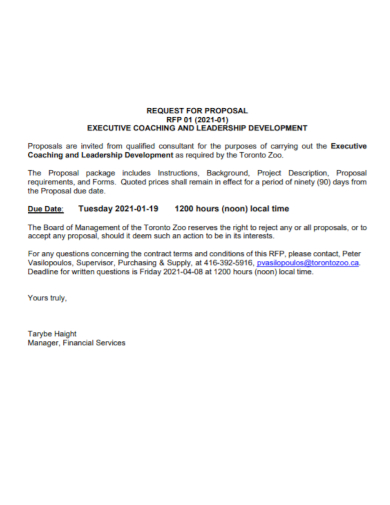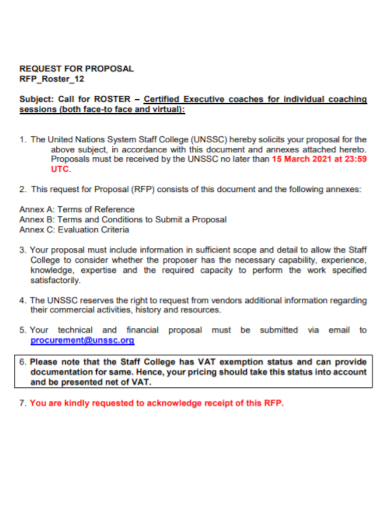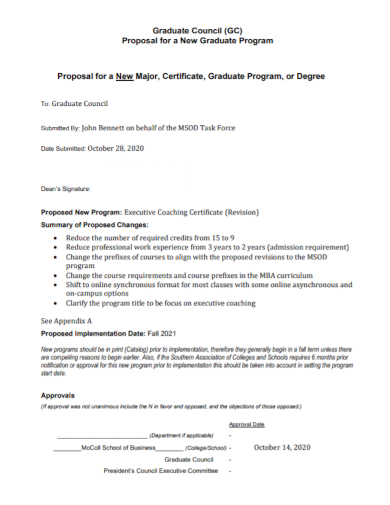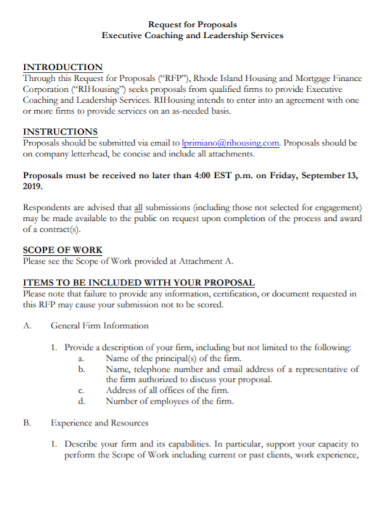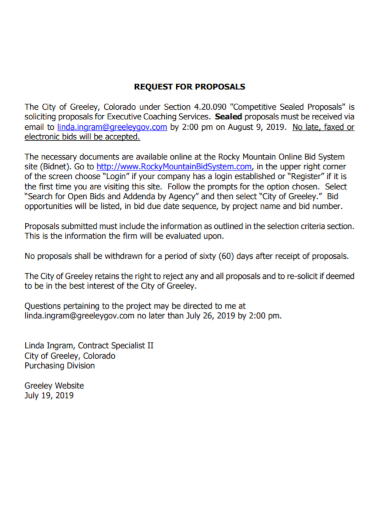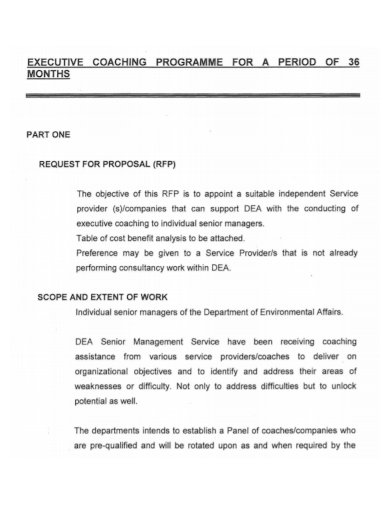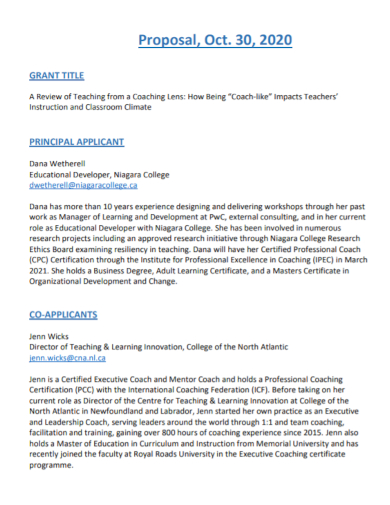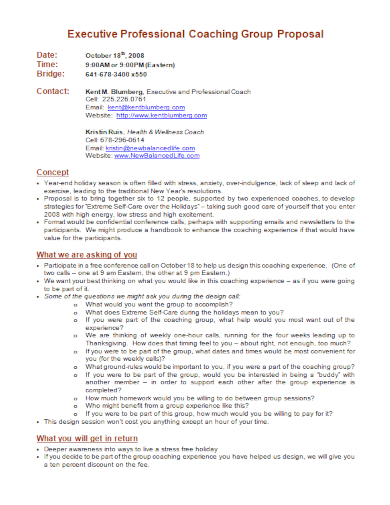8+ Executive Coaching Proposal Samples
Executive coaching, many people think this is a hard job or task because it involves handling a group of leaders or supervisors that is handling the company, institution or business establishment. But if you know too well the purpose and objective of having this task, you would be very up to challenge in making this possible. Executive coaching is defined as a helping relationship formed between a client who has managerial authority and responsibility in an organization and a consultant who uses a wide variety of behavioral techniques and methods to help the client achieve a mutually identified set of goals to improve his or her performance in managing his or her department or field assigned. This coaching must consist a lot of activities and planning involved to make it worthy and meaningful. To formalize this, an Executive Coaching Proposal should be made. In making this, you might caught yourself having a hard especially when doing it from scratch. To help you ease this burden, our site is offering you free, ready-made yet customizable templates that you could in your coaching proposal needs. Just browse among these templates and pick the one that hits the needs the most. Then customize it according to your preferences.
For other proposal or coaching template needs, we are also making available our templates like Coaching Report, Coaching Action Plan, Sports Coaching Plan, GROW Coaching Model, Coaching Skills Checklist, Coaching Session Checklist, Business Coaching Agreement, Coaching Contract and how to write it, etc.
This article will not only give you free and available templates but also provides you will useful and relevant information needed for your template needs. So come, explore the rest of the article with me, now!
1. Coaching Proposal
1. Executive Coaching Proposal Template
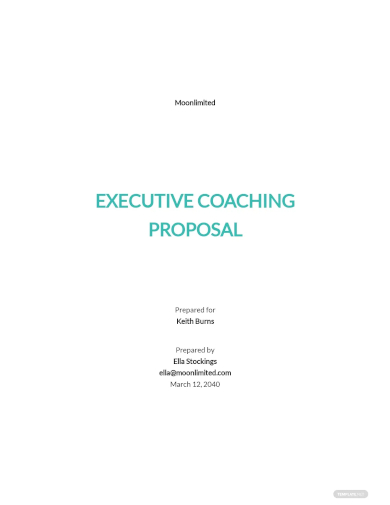
2. Executive Coaching Development Request for Proposal
3. Executive Coaching Session Request for Proposal
4. Graduate Executive Coaching Certificate Proposal
5. Executive Coaching Leadership Request for Proposal
6. Executive Coaching Services Request for Proposal
7. Executive Coaching Programme Request for Proposal
8. Executive Coaching Mentor Proposal
9. Executive Professional Coaching Group Proposal
Executive Coaching And All About It
Executive coaching involves a series of one-on-one interactions between a manager or executive and an external coach. The goal of coaching is to equip people with the knowledge and opportunities they need to develop themselves and become more effective. Behavior change is the goal of most executive coaching. An executive coach is a qualified professional that works with individuals (usually executives, but often high-potential employees) to help them gain self-awareness, clarify goals, achieve their development objectives, unlock their potential, and act as a sounding board. They are not consultants or therapists (although many have consulting or therapist backgrounds) and usually refrain from giving advice or solving their clients’ problems. Instead, they ask questions to help executives clarify and solve their own problems.
What Do Executive Coaches Do?
Executive coaches provide a confidential and supportive sounding board for their clients. They ask questions, challenge assumptions, help achieve clarity, provide resources, and yes, sometimes, with permission, provide advice. They often administer and help interpret 360-degree and behavioral assessments, conduct confidential interviews to help a client gain self-awareness, and establish development goals.
What Consists the Typical Coaching Process?
While there are many variations, executive coaching usually involves a series of phases, starting with intake, assessment, goal setting, and development planning. It then progresses through the development plan with periodic check-ins with the executive’s manager. The process is over when the development goals are achieved, or when the coach or pupil decides that it should stop. The typical duration of a coaching engagement is seven to 12 months.
Who Hires the Executive Coach?
Companies used to hire executive coaches to come in and fix broken executives. Nowadays, most companies hire executive coaches as a way to invest in their top executives and high potentials. It’s no longer a stigma to have a coach; it’s a status symbol. While executives can hire their own coaches (usually CEOs or business owners), it’s more common for companies (often the human resources department) to recommend a coach to an executive as a part of an executive development program. The pupil could be newly promoted (transition coaching), be facing a number of challenges (usually involving employee relationships), or getting groomed for larger roles. And yes, coaches are still hired to correct behavioral problems and help leaders resolve interpersonal conflicts.
FAQs
Is executive coaching confidential?
Conversations between a coach and their pupil are completely confidential. If an organization is paying for the coaching services, they may receive periodic status updates (dates, milestones achieved, etc.), but nothing else is shared without the participant’s permission.
How much does executive cost?
Coaching is a $3 billion-per-year industry worldwide, and, as the Harvard Business Review estimated, the median rate for an executive coach is $500 an hour. Many coaches will charge for a six- or 12-month engagement, but some will work on an hourly basis.
Where to find an executive coach?
There are many ways to find an executive coach. Your own company may already work with a number of trusted coaches. Executive recruitment or outplacement firms often provide coaching services or work on a referral basis with independent executive coaches. Word-of-mouth referrals from other executives can be a source—in fact, many of the most successful coaches don’t even advertise. When selecting an executive coach, chemistry is important, so it’s best to interview a few to find the right fit.
Making your proposal while planning out the intended outcomes or objectives, the activities involved and the attributes needed to be developed is a very difficult thing to do. With this, it is highly encouraged to make use of the available and ready-made, customizable templates that you can see in our site to help you make the best output you could ever have!
Related Posts
Title Proposal Samples [ Project, Thesis, System ]
Proposal Samples
Sports Event Proposal Samples
Small Business Proposal Samples
Title Project Proposal Samples [ Community, School, Student ]
FREE 10+ Product Supply Proposal Samples in MS Word | Google Docs | Apple Pages | PDF
FREE 10+ Health Project Proposal Samples [ Public, Mental, Healthcare ]
FREE 11+ Engineering Project Proposal Samples in PDF | MS Word
FREE 4+ Racing Sponsorship Proposal Samples [ Team, Car, Driver ]
FREE 10+ Nursing Project Proposal Samples [ Community, Health, Clinical ]
FREE 11+ Student Council Proposal Samples in PDF | DOC
FREE 10+ Facilities Management Proposal Samples in MS Word | Google Docs | Apple Pages | PDF
FREE 8+ Joint Venture Proposal Samples [ Commercial, Real Estate, Construction ]
FREE 10+ Scholarship Proposal Samples [ Project, Grant, Sponsorship ]
FREE 10+ Computer Purchase Proposal Samples in MS Word | Google Docs | Apple Pages | PDF

